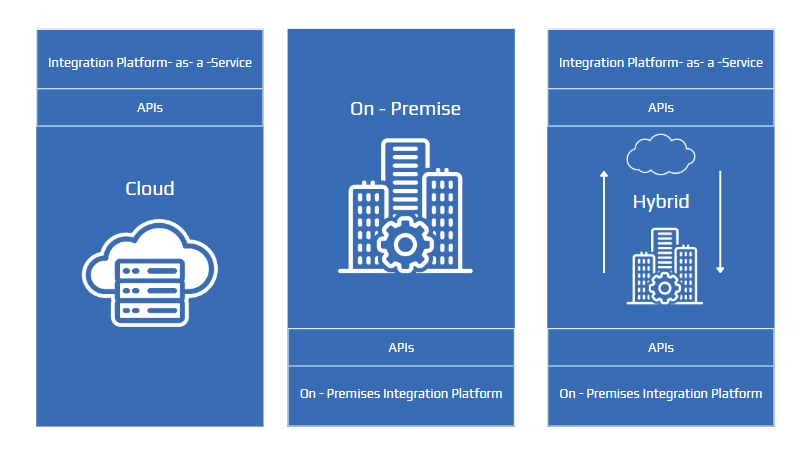The ERP system has been applied in Vietnam since the 2000s, helping businesses achieve great progress in operating processes. However, there are still many businesses that do not clearly understand this system, leading to missing out on great opportunities for development. Therefore, the blog below will provide readers with a better understanding of the concept of ERP software system and "The basic difference between Cloud ERP and On Premise ERP" and " Which solution should businesses use?"
What is an ERP system?
The ERP (Enterprise Resource Planning) system is understood as an operating software with the role of planning the resources of an enterprise. ERP software is a technology system that is integrated from many different applications to form modules of a single package.
I. What are Cloud ERP and On Premise ERP?
What is Cloud ERP? Cloud ERP is an enterprise resource planning (ERP) system that runs on a vendor’s cloud platform as opposed to an on-premises network, allowing organizations to access over the internet.
What is On premise ERP? On-premise ERP software is enterprise resource planning software that runs on in-house servers at your own location, or at locations under your control. An on-premise solution offers the security and control of using your own IT infrastructure to connect your people, processes, and systems.
Currently, On Premise ERP is still a safe choice for many business owners, although with quite expensive prices, On Premise ERP can make small businesses think twice.

II. Basic difference between Cloud ERP and On Premise ERP
1. The method of software deployment
This is the biggest difference between the two Cloud ERP and On Premise ERP systems. Cloud ERP uses resources stored on the provider's server. Businesses will access the system through a web browser.
In contrast, On Premise ERP is installed on the business's own server.
However, there are some units currently providing both Cloud ERP and On Premise ERP solutions at the same time, meaning the software will be stored on the cloud of the organization's servers.
2. Pricing Method
The second difference is the pricing method of the two types of ERP software.
Although there are many exceptions, most Cloud ERP software is usually priced on a monthly or annual basis (typical prices include training, upgrades, and support).
With On-premise ERP software, the price is usually calculated once for features and a fixed number of users. Support costs, training costs and software updates may or may not be included in the price, depending on the needs of the business. Because of the different pricing methods, On Premise ERP software systems will often cost businesses a fairly large investment at the same time.
In contrast, Cloud ERP software breaks costs down into different time periods, creating favorable conditions for businesses in the process of raising capital. Therefore, even small businesses with little capital can own their own ERP software.
According to statistics in 2015, up to 72% of businesses have been using Cloud ERP business management software. However, businesses also need to note that, over time, the total capital paid for Cloud ERP will reach the huge amount that other businesses invest in the On Premise ERP system.
3. Pros and Cons when using Cloud ERP software
Advantages |
Limitations | |
Cost | Low initial investment cost | Total payments over the entire life cycle may be more than with On-premise ERP |
Easily predict costs | ||
No additional hardware (server) investment required
| ||
Security |
All data is stored in the cloud, completely safe if the business's server is attacked
|
If the supplier discloses confidential information, the business may face big trouble
|
The system is more stable and is updated regularly from the supplier
| ||
Customization |
Businesses can work with suppliers to review changes
|
In general, customization features are limited
|
Deployment Time |
Takes less time, almost businesses can use immediately without installation
|
The short implementation time is also partly due to the lack of customization
|
4. Pros and Cons when using On premise ERP software
Advantages | Limitations | |
Cost | Reduce the initial cost of the system | A one-time upfront investment maybe risker |
Must pay for hardware investment and IT-related issues | ||
Security | Data security is completely within the control of the business | Some organizations may not be good proper security procedures, resulting in data being easily stolen |
Customization |
Greater customization capabilities
|
Customization can be complicated and slow down the implementation process, causing conflicts between the business and the supplier
|
Deployment | Enterprises have the right to control the time and implementation process |
Enterprises have the right to control the time and implementation process
|
III. Cloud ERP or On Premise ERP, which choice is best for your business?
Cloud ERP and On Premise ERP both have advantages and are suitable for different businesses, depending on specific requirements and business models.
- Cloud ERP is suitable for businesses that need flexibility, multiple branches, and want to reduce initial investment costs.
- Meanwhile, On Premise ERP is suitable for businesses that need to control data and customize ERP software according to their own requirements, and require offline operations.
We trust that this blog has offered valuable insights for our readers. For additional helpful information and practical guidance, feel free to contact us promptly.